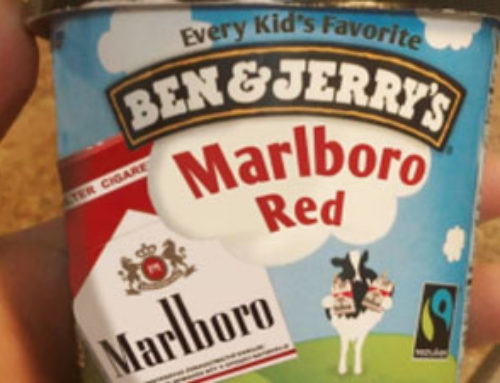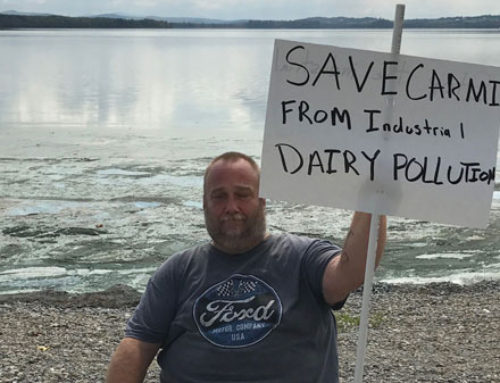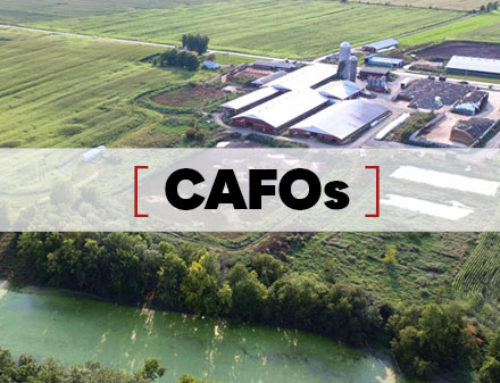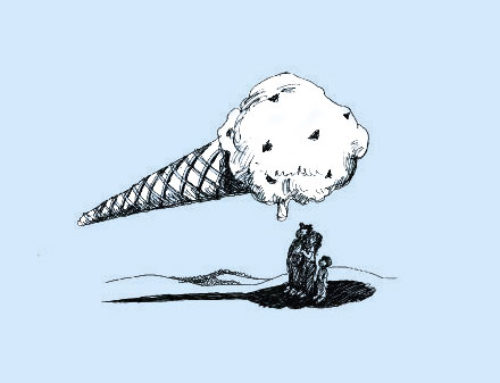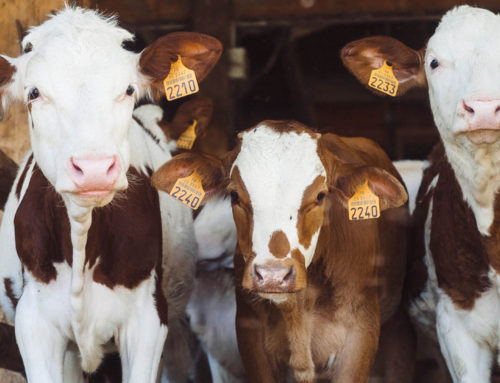To: Vermont Public Radio, Jane Lindholm, Ric Cengeri, Sam Gale Rosen, Mitch Wertlieb, Patti Daniels
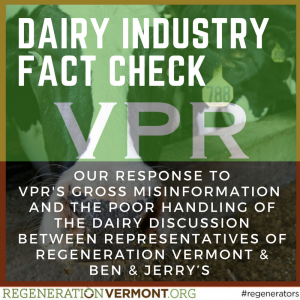 We write with serious concerns about the extreme lack of objectivity shown by Vermont Public Radio in its handling of the dairy discussion that took place on your airwaves between representatives of Regeneration Vermont and Ben & Jerry’s. Your attempts to “fact check” the discussion did little more than allow dairy industry representatives to denigrate our work with innuendo and obfuscation. We respectfully request, in light of the true facts presented below, that Regeneration Vermont be given an opportunity to respond – on air and within your electronic reach – to the woefully inaccurate response you provided to the original discussion. Specifically, we are requesting a retraction and correction to the record, the time and space necessary to provide the true facts to your audience, and an opportunity to take your representatives on a tour of Vermont’s dairy industry to counter the gross misinformation presented by the tour VPR took with industry representatives.
We write with serious concerns about the extreme lack of objectivity shown by Vermont Public Radio in its handling of the dairy discussion that took place on your airwaves between representatives of Regeneration Vermont and Ben & Jerry’s. Your attempts to “fact check” the discussion did little more than allow dairy industry representatives to denigrate our work with innuendo and obfuscation. We respectfully request, in light of the true facts presented below, that Regeneration Vermont be given an opportunity to respond – on air and within your electronic reach – to the woefully inaccurate response you provided to the original discussion. Specifically, we are requesting a retraction and correction to the record, the time and space necessary to provide the true facts to your audience, and an opportunity to take your representatives on a tour of Vermont’s dairy industry to counter the gross misinformation presented by the tour VPR took with industry representatives.
But let’s look at the facts, beginning with VPR’s attempts to “fact check.”
Antibiotics in the dairy supply: Antibiotic use on factory farms, the kind that dominate Vermont’s dairy industry, where cows never graze on pasture and remain locked-up for their decreasing lifespans, is considered a major problem in the food industry. The mainstream media is awash in reports on the issue, including an October 5, 2017 story in the Washington Post, for example, that begins by declaring antibiotics in the food system “an issue of skyrocketing concern among public health groups, shoppers and physicians.” It is irresponsible and simply untruthful to suggest otherwise. Even the most cursory of reviews on the issue will immediately reveal that food regulators and health advocates of all stripes remain seriously concerned about the overuse of antibiotics in animal agriculture. Consider, for example, the words of former FDA Commissioner, David Kennedy, in an op/ed in the Washington Post: “Today, the science is even clearer that antibiotic overuse in agriculture is dangerous…”
Instead of confirming the obvious problem, VPR allowed confined-dairy apologists to declare untruthfully that the problem doesn’t exist. Specifically, you quoted a listener – “Dan from West Glover” – to declare: “No milk with antibiotics EVER enters the food supply.”
Fact: If you consume non-organic dairy products you are consuming antibiotic residues. The U.S. FDA sets tolerances for these antibiotics – not bans. Thus, for each of the dozens of approved dairy cow medications, there are levels that are deemed “acceptable” for human consumption via the dairy products. Interestingly, these levels are set based on numerous factors, including human health impact and, extremely important for dairy, the impact on the dairy product itself. Many dairy products, especially yogurt, rely on natural bacteria and enzymes to exist, and, if antibiotic residues are too high, these necessary cultures will be killed off. So it’s not a matter of antibiotics or no antibiotics with so-called conventional dairy products, but rather how much or how many are we consuming.
Regeneration Vermont has spent the last seven months reviewing both federal and state data on the growing problem that is antibiotic-infected dairy and dairy-derived meat products (more than half the U.S. meat supply now comes from culled dairy cows), including the submission of numerous public records requests, interviews with regulators, farmers and farmworkers, veterinarians and public health officials. While not wanting to steal the thunder from the release of the full report, it is essential that the baseless claims that “antibiotics aren’t a problem in Vermont” not be allowed to stand without challenge.
Antibiotics are used extensively on Vermont’s confinement dairies, especially the growing number of these farms that warehouse thousands of cows in conditions that breed the maladies that require antibiotics to keep the cows in production, particularly udder infections (mastitis) and respiratory problems. Unfortunately, the FDA nor Vermont’s Agency of Agriculture keeps track of this antibiotic use, keeping the total usage figures locked up and private between the farms and their veterinarians. It’s this kind of “see no evil, hear no evil” approach from the Agency and other regulators that allows them to flourish in their role as cheerleader-in-chief for industrial dairies rather than regulating and policing their activities.
The Agency of Agriculture likes to comfort its see-no-evil-self by citing its official reports of antibiotic-infected loads that are dumped in the state. It’s true, these officially-reported violating loads are relatively few when compared to the total. But it doesn’t tell the real story, since farms and farmworkers simply do not report loads that are infected. Instead, they blend or dump infected loads rather than report them, a scenario made all the more economically possible since the price of the milk is so low. These contaminated loads are referred to by farmworkers and truckers as “hot loads,” and into the manure lagoons they go, destined for eventual spreading on farm fields and crop land.
Our review of the last six years of officially reported antibiotic-infected loads of Vermont-based milk is quite disturbing, including processing and sale of at least one infected load (St. Albans Co-op/Ben & Jerry’s), levels so high that the corporation supplying the test kits called them “off the charts,” and disgraceful reasons given for the violations (“the Mexicans did it”). In 2010, for example, there were over 600,000 gallons of officially-reported antibiotic-infected milk dumped in the Vermont, almost all of it going to just two farms’ manure pits for “disposal.”
Depression in cairy Cows: VPR attempted to “fact check” Regeneration Vermont’s citation of USDA farm animal mortality data which shows that 1% of U.S. dairy cows die of depression. We provided you with the citation, directly from the USDA’s National Animal Health Monitoring System, which, indeed, showed that our assertion was correct.
Nonetheless, VPR allowed Alison Kosakowski, director of communication and policy at the Vermont Agency of Agriculture, to cast doubt on this documented fact and, by insinuation, our reputation, by presenting this on your airwaves from her: “none of the three veterinarians on our staff have ever heard of a cow ‘dying from depression,’ in Vermont or elsewhere.”
This assertion by the Agency does not contradict in any way, shape or form the documented fact from the USDA that we cited. It only demonstrates the Agency’s lack of knowledge on the issue. Thus, to present this as some kind of “fact checking” is simply reckless and journalistically irresponsible.
Cabot farmer loss: Regeneration Vermont made the claim that farms were being lost at a high rate in Vermont, including within AgriMark/Cabot. No one disputes this farm loss. Our representative made the assertion that AgriMark was losing “10% of its farms every month” based on notes taken during a teleconference call on the “state of the dairy industry” organized by Dr. Bob Parsons of UVM Extension, a call that featured Bob Wellington of AgriMark (December 8, 2016).
Regeneration Vermont had two staff people on that phone call. The notes from these calls show a difference in opinion of what was said, in one case it was noted that Wellington reported a lost of “10% a month” and in the other it was heard as “10 farms a month.” Whichever is accurate, both show dramatic farm loss as reported by AgriMark’s own Wellington.
Furthermore, we requested the notes and/or audio of the teleconference meeting from both UVM Extension and the Ag Agency, which also promoted and participated in the call, to seek clarity on this issue. Unfortunately, the notes provided to us by Dr. Parsons, are not detailed enough to quote directly from Wellington’s farm-loss statement. However, the notes do include this observation: “Caller question regarding the number of farms that have been lost in NH, VT and NY in the last year. Decline is primarily smaller farms; however, production is up, despite farm numbers going down.”
Despite the universal understanding that farm numbers are going down, VPR allowed AgriMark’s corporate spokesperson, Doug Dimento, to question our recitation of this fact with the following easy-to-sniff-out spin: “For the record: We were mentioned near the end of the show where Allen alleged we had 1,500 farms and are losing 10 percent of them a month. We will get him the correct facts, but so you know, our Board of Directors (comprised of 14 dairy farmers) closed our membership two years ago due to limited plant capacity to handle all member milk. We also have a waiting list of more than 100 farmer (sic) who want to join Agri-Mark if room becomes available.”
This does not refute anything because it does not offer anything of substance, just spin. We do not dispute the fact that AgriMark is still handling the same amount of milk even though they are losing farmers because that is the trend both in Vermont and nationally, as small and medium-sized farms – the traditional “family farms” – go under as a result of large farm predation on them, buying them out and further concentrating cow herds. Last year alone, Vermont lost several dozen small and medium-sized dairy farms, but the number of farms with more than 700 cows (LFOs) rose from 26 to 30.
Moreover, it is disturbing that VPR would allow Dimento’s vague and rather flippant assertion that he “will get [Regeneration Vermont] the correct facts” to stand as a valid and quotable refutation to the well-accepted fact that farms are being lost at a staggering rate. Wouldn’t VPR want to have the “correct facts” before allowing this to be aired as part of your “fact checking”?
And, just so you know, we have not been provided with anything from Dimento or AgriMark/Cabot, as promised. Nor do we expect to. There is a long history of deep secrecy when it comes to providing basic facts about AgriMark/Cabot’s farmers and business practices. When, for example, one of its member farmers attempted to gain access to the corporation’s farmer list and information on executive salaries, AgriMark successfully fought the request in Delaware courts, where it is incorporated.
At the very least, VPR should insist that Dimento provide the information that he promised to provide on your airwaves. Until then, the only information available is information that supports our assertion: farms are being lost. Period.
Finally, about that farm tour: VPR ended its supposed “fact-checking” segment by accepting an invitation from a dairy farm veterinarian’s wife to tour some of Vermont’s biggest farms, all in an effort to “set the record straight” about Regeneration Vermont’s claims. Ironically, the veterinarian, Dr. Stephen Wadsworth, and his firm, Northwest Veterinarian Associates, were the target of an FDA enforcement action in 2013, in which repeated antibiotic violations were documented, including failures to “make a careful diagnosis and evaluation of the conditions for which the drug is to be used,” to “establish a substantially extended withdrawal period prior to marketing of milk, meat, eggs, or other edible products,” and to “take appropriate measures to assure that assigned timeframes for withdrawal are met and no illegal drug residues occur in any food-producing animal…”
Not exactly the poster-vet for “setting the record straight.”
Moreover, of the four farms featured in the tour, two are repeat antibiotic violators (Magnan Brothers Dairy and Howrigan Dairy), one has had a migrant worker die from being dragged into the farms manure disposal apparatus (Howrigan) and yet another has a family member who has been a long-time paid lobbyist for agri-chemical giants like Monsanto and Syngenta (Laggis Farm).
Not exactly the poster-farms for “setting the record straight.”
Again, we are deeply disturbed by the near-complete lack of objectivity in VPR’s handling of this issue. We ask that you take the time to review your reporting in light of our further documentation and present a truly factual account of Vermont’s dairy industry. Regeneration Vermont, at the very least, would like to have the opportunity to respond to the inaccurate and defamatory assertions that were allowed to be made about our work on your airwaves and on your website and social media platforms.
Moreover, in the spirit of fairness, we would like the opportunity to spend a day with your crew on a tour of Vermont’s large, confined dairy farms so that you can see the unvarnished reality of an industry that is wrecking great havoc on our economy, environment and sense of decency when it comes to farmworker conditions and animal welfare.
We look forward to hearing from you about how you’d like to proceed with the retractions, corrections and invitations that we have outlined.
